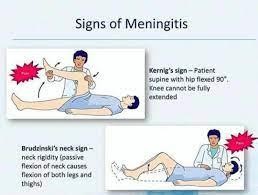A client is brought to the emergency department due to vomiting, fever, and a severe headache. The physician suspects meningitis; then assesses the client for meningeal irritation and spinal nerve root inflammation. The nurse documents a positive Kernig's sign when:
The client's forearm spasms when a blood pressure cuff is inflated on the upper arm.
The client complains of pain when his knee is extended with his hip flexed.
The client feels pain in the calf when his foot is dorsiflexed.
The client has a stiff neck when the neck is flexed towards the chest.
The Correct Answer is B
Choice A rationale: This is a positive Trousseau's sign, which indicates hypocalcemia or tetany. It is not related to meningitis or meningeal irritation.
Choice B rationale: Kernig's sign is indicated when there is resistance and pain with knee extension and hip flexion, suggesting meningeal irritation.
Choice C rationale: This is a positive Homan's sign, which indicates deep vein thrombosis or phlebitis. It is not related to meningitis or meningeal irritation.
Choice D rationale: This is a sign of nuchal rigidity, which indicates meningeal irritation, but it is not specific to Kernig's sign. Nuchal rigidity can also be caused by other conditions such as cervical arthritis or muscle spasm.

Nursing Test Bank
Naxlex Comprehensive Predictor Exams
Related Questions
Correct Answer is C
Explanation
Choice A rationale: A glycated hemoglobin (HbA1c) value of 6.9 indicates that the client has prediabetes, which is a risk factor for developing diabetes.
Choice B rationale: A postprandial blood glucose level of 170 mg/dL is within the normal range.
Choice C rationale: This indicates that the client has diabetes mellitus. According to the American Diabetes Association, a diagnosis of diabetes can be made if one of the
following criteria is met: a fasting plasma glucose level of 126 mg/dL or higher, a postprandial blood glucose level of 200 mg/dL or higher, or an HbA1c value of 6.5% or higher.
Choice D rationale: A fasting plasma glucose level of 90 mg/dL is within the normal range.
Correct Answer is A
Explanation
Choice A rationale: With type 2 diabetes, insulin secretion is decreased, and insulin resistance is increased. This means that the pancreas does not produce enough insulin, and the cells of the body do not respond well to the insulin that is available. Insulin is a hormone that helps the body use glucose (sugar) for energy. Without enough insulin or with insulin resistance, glucose builds up in the blood, leading to high blood sugar levels and various complications.
Choice B rationale: This statement describes Type 1 diabetes, where the immune system destroys insulin-producing cells.
Choice C rationale: This describes type 1 diabetes, not type 2 diabetes. People with type 2 diabetes may or may not need to take insulin, depending on how well they can control their blood sugar levels with diet, exercise, and oral medications.
Choice D rationale: This refers to pancreatitis, which is a condition where the pancreas becomes inflamed due to infection, injury, or alcohol abuse. Pancreatitis can cause
severe abdominal pain, nausea, vomiting, fever, and elevated levels of pancreatic enzymes in the blood.
Whether you are a student looking to ace your exams or a practicing nurse seeking to enhance your expertise , our nursing education contents will empower you with the confidence and competence to make a difference in the lives of patients and become a respected leader in the healthcare field.
Visit Naxlex, invest in your future and unlock endless possibilities with our unparalleled nursing education contents today
Report Wrong Answer on the Current Question
Do you disagree with the answer? If yes, what is your expected answer? Explain.
Kindly be descriptive with the issue you are facing.
